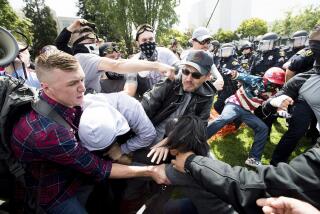Gang Member’s Crack Conviction Reversed : Courts: Appeals justices say defense was wrongly denied records on whether U.S. prosecutors unfairly target blacks.
- Share via
In the first ruling of its kind, a federal appeals court has overturned the crack cocaine conviction of a San Diego gang member because defense lawyers were denied government records related to charges that federal law enforcement unfairly targets blacks for prosecution.
The decision by the U.S. 9th Circuit Court of Appeals in San Francisco said District Judge Judith Keep set too high a standard to determine whether the accused, Nolan Reese, should be granted documents from the U.S. attorney’s office and a hearing to explore whether minorities are singled out in crack cases.
Reese, a member of the Crips street gang in east San Diego, was convicted of crack trafficking and sentenced to 14 years in prison in 1993. He was tried for selling about 2 1/2 ounces of crack to a government informant.
During the case, Judge Keep rejected a motion to open government files by defense attorneys looking into the possibility that minorities are prosecuted for crack violations because of their race. Although they gave Keep some statistical evidence of discrimination, she said it failed to meet “a high threshold” of proof required by federal law.
But a panel of three justices, in an opinion released Wednesday, unanimously threw out Reese’s conviction, ruling that defense attorneys need only show some indication--or a “colorable basis”--of discrimination to justify the release of information in the government’s hands. Keep should have used that less stringent requirement, justices said.
Reese’s lawyers had provided the court with figures showing that out of 193 crack defendants prosecuted between 1989 and 1993 at the federal courthouse in San Diego, only one was white. The rest were blacks and Latinos.
They also submitted a report from the San Diego Assn. of Governments indicating that law enforcement concentrated its crack cocaine investigations in San Diego’s black neighborhoods although at least one white community in town was known for crack trafficking.
Keep’s “requirements were insurmountable. She basically asked us to show that the government intentionally discriminated before seeing what the evidence is,” Janice D. Hogan, Reese’s appeals lawyer, said in an interview.
Federal authorities in San Diego deny that they have discriminated against blacks and Latinos. They say they concentrate on minority communities because that is where the crack problem is the most prevalent and destructive.
Assistant U.S. Atty. Michael E. Lasater said he did not know whether Reese would be retried. He said he might ask the 9th Circuit for a rehearing on the discovery issue, or ask that all 11 justices hear the case.
The Reese decision is the latest development in an ongoing political and legal debate about the impact of the nation’s strict crack cocaine laws on minority communities.
At the federal courthouse in Los Angeles, only one case involved a white defendant out of more than 200 crack prosecutions since 1986, when Congress passed tough mandatory minimum sentences for crimes involving the drug.
In a case similar to Reese’s, the 9th Circuit Court dismissed crack charges in March against four African Americans after the U.S. attorney in Los Angeles failed to turn over documents to defense attorneys alleging racial discrimination.
More recently, a district judge denied a defense request for records in another local crack case after federal prosecutors presented a 500-page brief to rebut charges of selective prosecution. The judge said she found no indication of discrimination in that case.
Nationally, 96% of those prosecuted in federal court for crack cocaine offenses are African American or Latino, though surveys indicate that whites account for the majority of crack users across the country.
More to Read
Sign up for Essential California
The most important California stories and recommendations in your inbox every morning.
You may occasionally receive promotional content from the Los Angeles Times.














